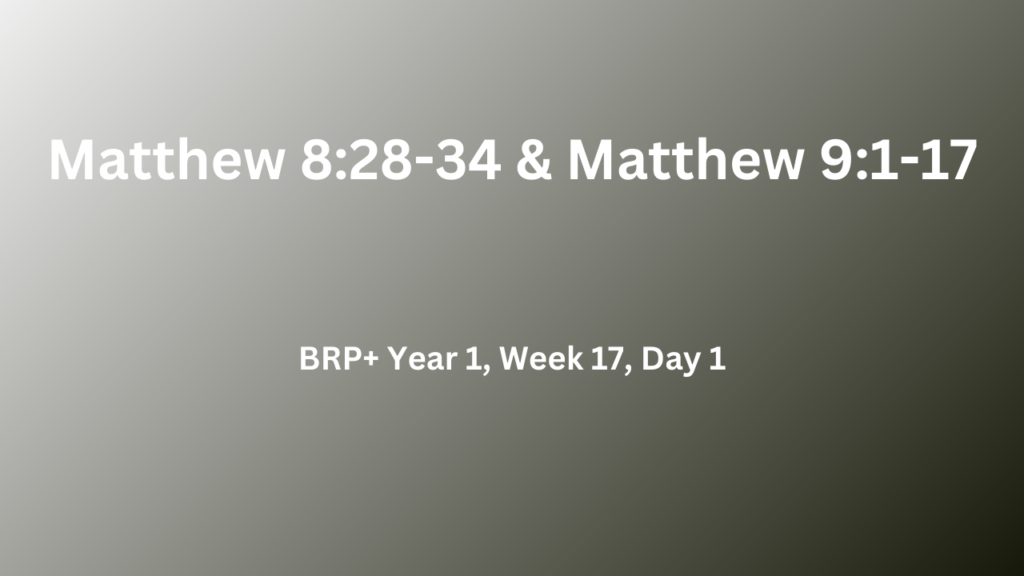Matthew 8:28-34 & Matthew 9:1-17
Q.1. How did the demon-possessed man respond to Jesus? How did the city respond to the exorcism? Why? What point did Matthew wish to convey in his shortened version? – (Mt.8:28-34 c.f. Mk.5:1-20)
The demons knew Who Jesus was, and were aware of their future destiny – … What business do we have with each other, Son of God? Have You come here to torment us before the time? (Mt.8:29). They requested that He cast them into a herd of swine (see Mt.8:31). Since the captivity of Israel, the land had become the home of Gentile nations (see Mt.4:15-16). Jesus permitted their request, with the result that the herd panicked and were drowned in the sea (see Mt.8:32). Mark expanded on the story and recorded how the demon possessed man was totally freed (see Mk.5:15). Though they had previously been unable to pass by that way – … the whole city came out to meet Jesus; and when they saw Him, they implored Him to leave their region (Mt.8:34 c.f. Mt.8:28). Mark focused on the one man who desired to follow Jesus (see Mk.5:18-19). Matthew inserted the story to show the complete power of Jesus over the forces of darkness. The Gadarenes made a short-sighted decision.
Q.2. What made the response of Jesus to the paralytic man controversial? How did His words prove His deity? How did the people respond? (Mt.9:1-8 c.f. Mk.2:1-12)
Jesus went from Gadara back to Capernaum (see Mt.4:13; 8:34; 9:1). Matthew gave an abridged version of the healing of the paralytic man, to prove Christ’s Messiahship (see Mt.9:2-7 c.f. Mk.2:3-12; Lk.5:18-26). The Scribes and Pharisees in attendance were outraged when Jesus controversially claimed to forgive the man’s sins (see Mt.9:2-4 c.f. Lk.5:21). It was not uncommon for priests to give absolution for sins. How could the people tell if the promise of forgiveness was ratified by God? To prove His authority Jesus asked – Which is easier, to say, `Your sins are forgiven,’ or to say, `Get up, and walk’? (Mt.9:5). The answer was obvious. They could not check if a person’s sins were forgiven, because that is God’s prerogative. However, the raising of a paralysed man was checkable. He would either walk or stay paralysed. To prove His authority – that you may know that the Son of Man has authority on earth to forgive sins”– He said to the paralytic, “Get up, pick up your mattress and go home (Mt.9:6). The man got up and went home, thus confirming Christ’s divine authority to forgive sins. The people loved it, and – … were awestruck, and glorified God, who had given such authority to men (Mt.9:8).
Q.3. What made the call of Matthew unusual? Why did the Pharisees criticize Jesus for the companions He kept? How did Jesus explain His mission? – (Mt.9:9-13)
Matthew was a despised tax-collector for the Roman government and was a Jew who was shunned by the people and the religious system of Judaism. His call to follow Jesus made a huge impression (see Mt.9:9). However, the Pharisees were especially outraged by what happened next – … as Jesus was reclining at the table in the house, behold, many tax collectors and sinners came and were dining with Jesus and His disciples (Mt.9:10). It was inconceivable to the Pharisees that Jesus would lower Himself to share a relaxed meal with one they considered to be the scum of society (see Mt.9:11). Jesus responded – … It is not those who are healthy who need a physician, but those who are sick (Mt.9:12). He supported His contention by quoting from Hosea 6:6, highlighting Messiah’s mission – go and learn what this means: `I desire compassion, and not sacrifice,’ for I did not come to call the righteous, but sinners (Mt.9:13). Israel’s leaders failed the test again.
Q.4. Why did the disciples of Jesus not fast? What point was Jesus making with His parables? Does His message still apply today? – (Mt.9:14-17)
Fasting was a common religious activity that people practiced outwardly, trying to earn merit with God. Jesus taught that it should be done secretly before God (see Mt.6:16-18). Not surprisingly, John had taught his disciples to fast, in order to prepare for the coming Messiah. John’s disciples asked Jesus why they and the Pharisees fasted, but His disciples did not (see Mt.9:14). Jesus explained that fasting was appropriate at certain times of great need, but not appropriate at other times – … The attendants of the bridegroom cannot mourn if the bridegroom is with them, can they? But the days will come when the bridegroom is taken away from them, and then they will fast (Mt.9:15). Fasting is intended to remove any distractions, so that we might draw near to God. That is not always needed when Christ, the Bridegroom is present. The coming of Jesus brought in a brand-new approach to God, which Jesus explained with two parables – 16 But no one puts a patch of unshrunk cloth on an old garment; for the patch pulls away from the garment, and a worse tear result. 17 Nor do people put new wine into old wineskins; otherwise, the wineskins burst, and the wine pours out and the wineskins are ruined; but they put new wine into fresh wineskins, and both are preserved (Mt.9:16-17). Jesus was pointing forward to the New Covenant that He would seal with His own blood, about which the writer to the Hebrews declared – When He said, “A new covenant,” He has made the first obsolete. But whatever is becoming obsolete and growing old is ready to disappear (Heb.8:13 c.f. Lk.22:20). The gospel ushers in a better covenantal relationship (see Heb.10:19-25).

